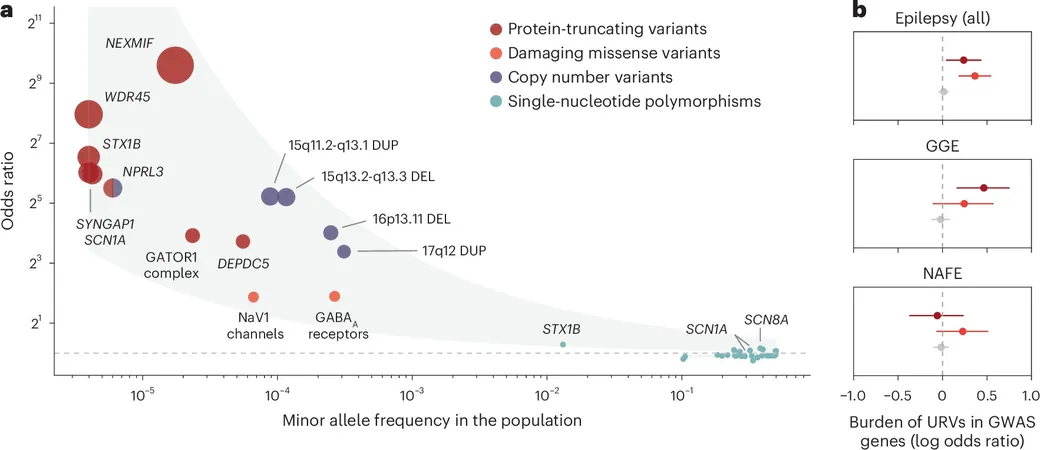
Groundbreaking Study Unveils New Genetic Insights for Epilepsy Treatment
2024-10-03
Author: Sarah
In a monumental leap for epilepsy research, the most extensive and diverse genetic study to date has pinpointed new potential therapeutic targets that may revolutionize treatment options for the millions affected by this common neurological disorder. The findings indicate a deeper understanding of how neurons communicate and fire, opening the door for innovative therapies tailored to individual patient needs based on their unique genetic makeup.
Epilepsy, a disorder that affects approximately 1 in 26 people at some point in their lives, is heavily influenced by genetic factors. Despite previous studies, pinpointing specific genetic contributions to the risk of developing epilepsy has been notoriously difficult. Epilepsy encompasses a variety of subtypes, with some, like developmental encephalopathies, better understood than others, such as genetic generalized epilepsy and non-acquired focal epilepsy (NAFE).
This groundbreaking research was published in the esteemed journal Nature Neuroscience and orchestrated by the Epi25 Collaborative—a consortium of over 200 international researchers committed to elucidating the genetic foundations of epilepsy. Building on past work, the study now includes data from more than 54,000 participants, nearly doubling the size of prior research efforts, thus providing a more comprehensive picture of genetic variants associated with the disorder.
Led by renowned experts, Benjamin Neale from the Broad Institute of MIT and Harvard, and Samuel Berkovic from the University of Melbourne, the team utilized whole exome sequencing—an advanced technique that examines every gene in the genome's protein-coding regions. "For a complex and heterogeneous disorder like epilepsy, we aimed to survey a wide array of genetic variations," explained Siwei Chen, the first author and postdoctoral scholar in Neale's lab.
Uncovering Ultra-Rare Variants
Since its inception in 2014, the Epi25 initiative has amassed crucial genetic data from patients with various forms of epilepsy, including those that are severe and those that are generally milder. To delve deeper into the genetic underpinnings of these subtypes, researchers focused on identifying "ultra-rare variants" (URVs)—genetic mutations occurring in fewer than 1 in 10,000 participants. Discovering a higher prevalence of these variants in people with epilepsy compared to controls can indicate their significance in the disorder's pathology.
The study analyzed the genetic data from a diverse population across the globe, encompassing about 21,000 individuals diagnosed with epilepsy and 33,000 controls. This extensive genetic data revealed crucial correlations between disease risk and multiple genes responsible for neuron signal transmission, particularly focusing on ion channel proteins, including those related to the GABAA neurotransmitter.
Interestingly, while each epilepsy subtype exhibited unique genetic contributions, the variants linked to ion channel proteins varied across different forms of the disorder. In particular, the gene DEPDC5 showed a robust association with NAFE, suggesting its critical role within a protein complex dubbed GATOR1, which is essential for brain cell function. By analyzing gene data that interact within the same pathways, the researchers were able to draw more powerful conclusions about the biological mechanisms involved in NAFE.
Looking ahead, these insights could pave the way for more personalized treatment strategies that are genetically informed. Doctors may be able to adapt their approaches based on a patient's specific genotypic profile, improving the effectiveness of genetic testing and enhancing the understanding of how genetic variations contribute to the disease.
Benjamin Neale aptly stated, "These genetic insights offer data-driven opportunities to decode the biology of epilepsies, ultimately fueling advancements in diagnosis and subtype-targeted treatment methods." As the research community eagerly anticipates further application of these findings, the hope is that this genetic roadmap will dramatically transform epilepsy care for the better.
Stay tuned—this research marks just the beginning, and the future of epilepsy treatment looks brighter than ever!





 Brasil (PT)
Brasil (PT)
 Canada (EN)
Canada (EN)
 Chile (ES)
Chile (ES)
 España (ES)
España (ES)
 France (FR)
France (FR)
 Hong Kong (EN)
Hong Kong (EN)
 Italia (IT)
Italia (IT)
 日本 (JA)
日本 (JA)
 Magyarország (HU)
Magyarország (HU)
 Norge (NO)
Norge (NO)
 Polska (PL)
Polska (PL)
 Schweiz (DE)
Schweiz (DE)
 Singapore (EN)
Singapore (EN)
 Sverige (SV)
Sverige (SV)
 Suomi (FI)
Suomi (FI)
 Türkiye (TR)
Türkiye (TR)